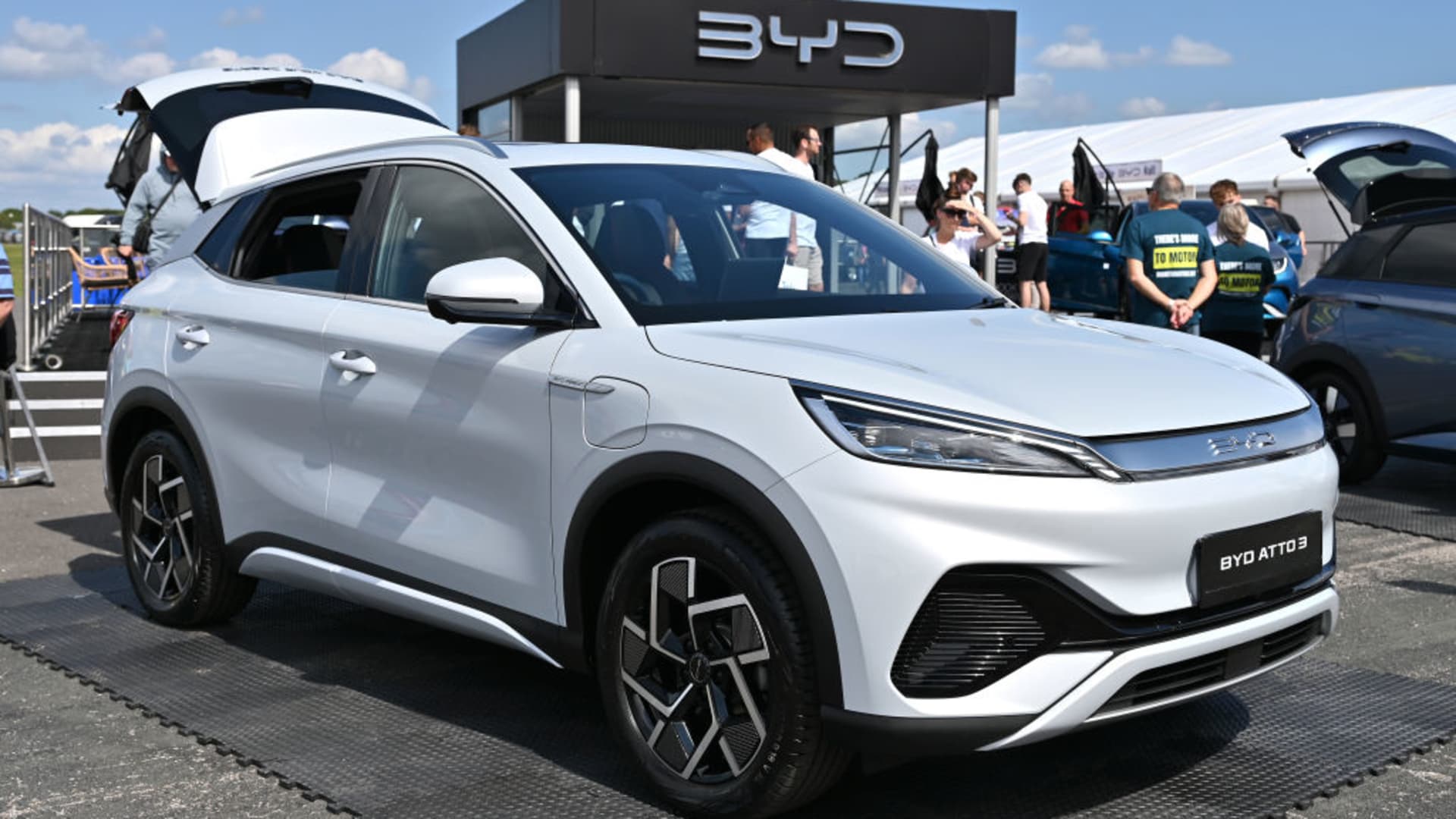Shares of Chinese automaker BYD listed in China jump more than 5% Tuesday, a day after posting a stellar jump in first half profit.
Thanks to record deliveries, the Chinese electric car maker on Monday posted a 204.68% jump in net profit for the first half of the year — that’s net earnings of 10.95 billion yuan ($1.50 billion) in the January to June period, compared to 3.59 billion yuan a year earlier.
Hong-Kong listed shares of the automaker rose 5.6% while stocks in Shenzhen were up as much as 4.75% on Tuesday.
The strong numbers were mainly attributable to rapid growth in the new energy vehicle business, the firm said in a stock filing.
Revenue in the first six months increased 72.72%, compared to the first half of 2022, according to the stock filing.
“If you look at BYD numbers, clearly the top line growth has been very strong, but we are even more impressed by its margins. BYD’s gross margin in the first half was 18%. That’s Tesla’s gross margin,” according to Jiong Shao, Barclays’ China technology analyst.
China’s top-selling car brand posted its best-ever quarterly sales results. Sales of passenger new energy vehicles in the second quarter were 700,244 units, up about 98% year-on-year, according to the company.
In comparison, U.S. rival Tesla reported deliveries of 466,140 vehicles globally for the second quarter.
China is the largest auto market in the world by sales and production. It is also the largest EV market in the world, and a key driver in the push toward electric cars.
“BYD is targeting mass market where Tesla cannot reach,” said Vivek Vaidya, associate partner at Frost & Sullivan, on CNBC’s “Street Signs Asia” Tuesday.
“You will see China-made vehicles which will offer significant price advantage over Tesla [with] similar features, stunning looking cars,” said Vaidya.
Price war
BYD is under pressure from a price competition among domestic rivals as well as Tesla.
Elon Musk’s EV-maker slashed the prices of its Model S and Model X in August as the company looked to gain market share amid rising competition in China. The additional cuts came the same month that Tesla dropped prices for its Model Y and Model 3.
Earlier this year, BYD and its domestic rivals such as Nio and Xpeng also cut prices.
“The lower price to squeeze out of the weaker players is really a good thing for the health of the industry,” Shao from Barclays told CNBC’s “Squawk Box Asia” on Tuesday.
“BYD’s operating margin was 5% which is a pretty healthy operating margin and many players in the Chinese EV market even have negative gross margin, let alone operating margin,” Shao said.
The price cuts come as consumers remain cautious on spending amid a weaker than expected economic recovery in China after strict Covid restrictions were lifted.
Vaidya of Frost & Sullivan said the brands are lowering prices to get as many of their products into the market as possible.
“EVs are slightly different than internal combustion engine vehicles. EVs also make money for the OEMs who sell them,” said Vaidya, referring to original equipment manufacturers such as Tesla, in this case.
“When they are running, for example, Tesla has charging points and therefore every mile that is run on Tesla, Tesla gets some money back. So the discounting or the price war that is happening is to get the product out there in the market,” said Vaidya.
“After that, it will start earning money.”
Competitive landscape
BYD is also expanding its business outside the automobile space. On Monday, BYD announced that its electronics arm is acquiring U.S.-based Jabil’s mobile electronics manufacturing business in China for approximately $2.2 billion.
BYD Electronics manufactures a range of products including smartphones, tablet PCs, new-energy vehicles, robots and communications equipment.
Domestic rival Xpeng on Monday said it was buying Didi’s smart electric car development business in an exchange of shares worth $744 million. Xpeng said it plans to develop an electric car for launch next year under a new mass market brand.
Xpeng is also co-developing two new EVs with Volkswagen that will incorporate Xpeng’s advanced driver-assist software for the Chinese market with a rollout target for 2026.
Volkswagen in July said that it will be investing $700 million into Xpeng and taking a 4.99% stake in the company.
— CNBC’s Evelyn Cheng contributed to this report.
